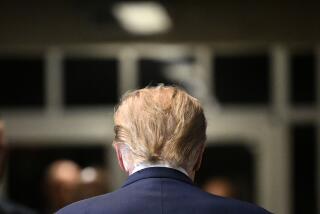Stem cell study funds pass House
The House plunged back into the emotional debate over embryonic stem cells Thursday, voting to expand federal funding for the controversial research.
The bill, part of Speaker Nancy Pelosi’s 100-hour agenda, has broad support in both chambers, but is expected to face opposition from President Bush, who imposed strict limits on federal funding for embryonic stem cell research in 2001, and in 2006 used his veto power for the only time to reject an identical bill.
“It is time for President Bush to allow this groundbreaking research to move forward,” said Rep. Diana DeGette (D-Colo.), author of the bill, whose 13-year-old daughter has diabetes. “The American people clearly support scientific funding and the use of embryonic stem cells to address some of our most debilitating diseases.”
The bill passed 253 to 174, with 37 Republicans joining most Democrats in favor, and 16 Democrats opposing it.
In three hours of often charged debate, some lawmakers spoke of family and friends who they said could be helped by embryonic stem cells, while others warned that the legislation would involve the government in the destruction of human embryos.
Rep. Joe Sestak (D-Pa.) rose to speak about his young daughter’s malignant brain tumor and his hopes that the research would not be ignored. “Why would we preclude options for potential treatment?” he asked.
But Georgia Republican John Linder warned of a hidden agenda. “Are we seeking a way of getting the government’s imprimatur on ending a life that is not useful?” he asked. Referring to Adolf Hitler, he said: “The first in the gas chamber were retarded children.... We are moving in that direction today.”
All of California’s Democrats voted for the measure. It also received backing from GOP Reps. Mary Bono of Palm Springs, Ken Calvert of Corona, David Dreier of San Dimas, Darrell Issa of Vista, Jerry Lewis of Redlands, Howard P. “Buck” McKeon of Santa Clarita, Dana Rohrabacher of Huntington Beach and Brian Bilbray of Solana Beach.
Embryonic stem cells are valuable to researchers because they can be coaxed to grow into any kind of tissue. Scientists see an opportunity for medical advances on diseases like Alzheimer’s, Parkinson’s and diabetes, as well as spinal cord injuries, but the field is still in its infancy.
The House legislation would allow federal funding for research on stem cells drawn from embryos that would otherwise be discarded by fertility clinics. They could be used only if the donors gave written consent and received no money or inducement.
On Aug. 9, 2001, Bush issued an executive order that limited federal funding for embryonic stem cell research to cell lines that existed before that date. Today, 22 cell lines are available, but many are of questionable value.
The federal government spends $25 billion a year on scientific research, and funding for embryonic stem cells is about $15 million a year, according to Lawrence Soler, vice president for government relations at the Juvenile Diabetes Research Foundation.
In the absence of strong federal research, California and some other states have started their own programs. Although California’s embryonic stem cell initiative still faces lawsuits from opponents, the California Institute for Regenerative Medicine plans to award $3 billion in grants over 10 years.
In Thursday’s debate, social conservatives spoke about the issue as an extension of the abortion debate, whereas the bill’s supporters framed it as a matter of medical research.
That clash of faith and science roiled the election campaign when conservative commentator Rush Limbaugh accused actor Michael J. Fox of faking the effects of his Parkinson’s disease when he campaigned for a candidate who supported embryonic stem cell research.
Conservatives also cited recent research showing that amniotic fluid stem cells could be used to produce several different kinds of tissue without the destruction of embryos. “I am disappointed the Democratic majority was not willing to allow time for this new development to be thoroughly examined,” said Minority Leader John A. Boehner (R-Ohio).
But some antiabortion lawmakers rose in support of the bill. Advocates said this growing bloc was the result of greater education and the example of conservatives like former Sen. Bill Frist (R-Tenn.), Sen. Orrin G. Hatch (R-Utah) and Nancy Reagan, who back embryonic stem cell research.
At one point, Rep. Jim Langevin (D-R.I.) drove his electric wheelchair to the podium to announce his support for the legislation. “Being pro-life, I didn’t come to this decision lightly,” said Langevin, who was injured in an accidental shooting almost 26 years ago. “While I always held out hope that I would one day walk again, it was not until the tremendous potential and advances in the field of stem cell research that I truly understood how a cure might work. I believe that being pro-life means fighting for legislation that will eliminate pain and suffering and help people enjoy longer, healthier lives.”
The Senate is expected to pass similar legislation later this year and, although lawmakers hope to compromise with the White House, Bush has refused to meet with DeGette or legislation co-sponsor Michael N. Castle (R-Del.) on the issue.
If the president vetoes another stem cell bill, Congress can try to vote to override him. This would take 67 votes in the Senate and 290 votes in the House, which is seen as unlikely.
More to Read
Get the L.A. Times Politics newsletter
Deeply reported insights into legislation, politics and policy from Sacramento, Washington and beyond. In your inbox three times per week.
You may occasionally receive promotional content from the Los Angeles Times.






